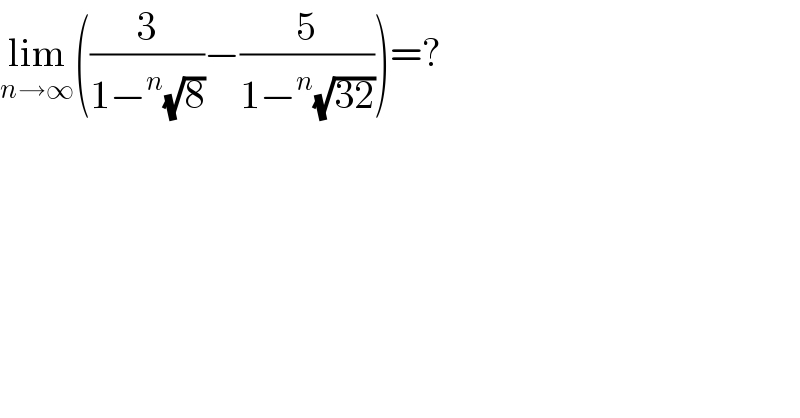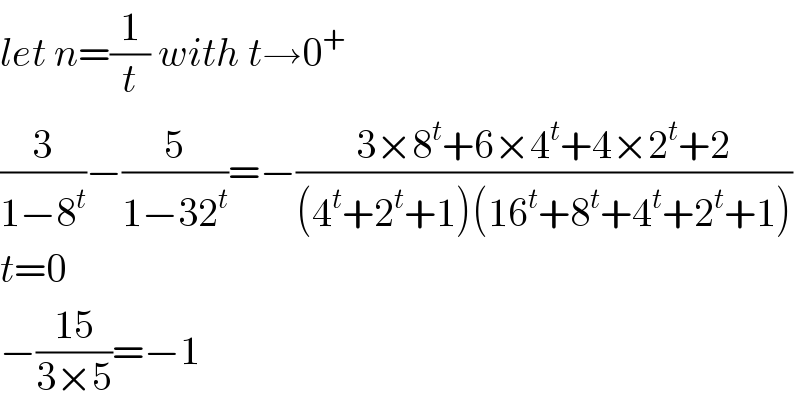
Question and Answers Forum
Question Number 109763 by Karani last updated on 25/Aug/20

Answered by bemath last updated on 25/Aug/20
![▽((♭e)/(math))Δ lim_(n→∞) ((3−3 ((32))^(1/(n )) −5+5 (8)^(1/n) )/(1−((32))^(1/n) −(8)^(1/n) +((256))^(1/(n )) )) = let (1/n) = t { ((n→∞)),((t→0)) :} lim_(t→0) [((−2−3 (32)^t +5 (8)^t )/(1−(32)^t −(8)^t +(256)^t )) ]= lim_(t→0) [((−2−3(2^t )^5 +5(2^t )^3 )/(1−(2^t )^5 −(2^t )^3 +(2^t )^8 )) ]= set 2^t = m,m→1 lim_(m→1) [((5m^3 −3m^5 −2)/(m^8 −m^3 −m^5 +1))]= L′Hopital lim_(m→1) [((15m^2 −15m^4 )/(8m^7 −3m^2 −5m^4 )) ]= lim_(m→1) [((15−15m^2 )/(8m^5 −3−5m^2 )) ] = lim_(m→1) [((−30m)/(40m^4 −10m)) ] = ((−30)/(30))=−1](Q109780.png)
Answered by Her_Majesty last updated on 25/Aug/20

Answered by john santu last updated on 25/Aug/20

| ||
Question and Answers Forum | ||
Question Number 109763 by Karani last updated on 25/Aug/20 | ||
 | ||
Answered by bemath last updated on 25/Aug/20 | ||
![▽((♭e)/(math))Δ lim_(n→∞) ((3−3 ((32))^(1/(n )) −5+5 (8)^(1/n) )/(1−((32))^(1/n) −(8)^(1/n) +((256))^(1/(n )) )) = let (1/n) = t { ((n→∞)),((t→0)) :} lim_(t→0) [((−2−3 (32)^t +5 (8)^t )/(1−(32)^t −(8)^t +(256)^t )) ]= lim_(t→0) [((−2−3(2^t )^5 +5(2^t )^3 )/(1−(2^t )^5 −(2^t )^3 +(2^t )^8 )) ]= set 2^t = m,m→1 lim_(m→1) [((5m^3 −3m^5 −2)/(m^8 −m^3 −m^5 +1))]= L′Hopital lim_(m→1) [((15m^2 −15m^4 )/(8m^7 −3m^2 −5m^4 )) ]= lim_(m→1) [((15−15m^2 )/(8m^5 −3−5m^2 )) ] = lim_(m→1) [((−30m)/(40m^4 −10m)) ] = ((−30)/(30))=−1](Q109780.png) | ||
| ||
Answered by Her_Majesty last updated on 25/Aug/20 | ||
 | ||
| ||
Answered by john santu last updated on 25/Aug/20 | ||
 | ||